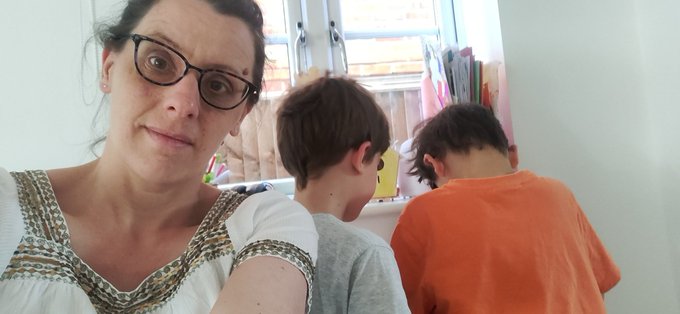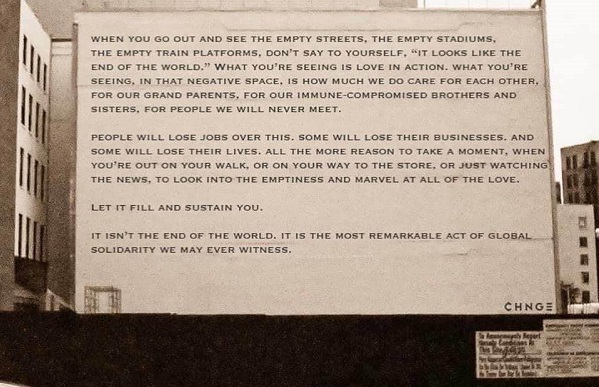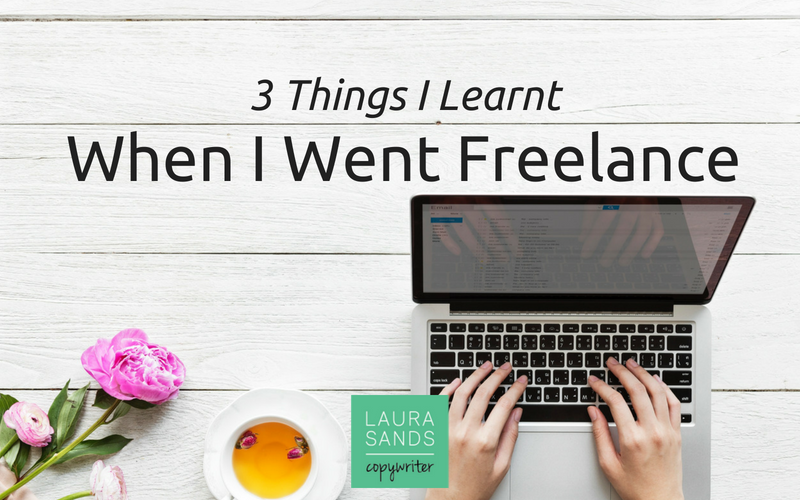Today, for the first time in months I am on my own.
I realise that others, on their own for months, might see this as no cause for celebration. The space and isolation can feel as oppressive as constant contact and noise.
Our need and preferences for space vary so much. Too much and we feel lost, alone. Too little and we feel cramped and irritable. And the ‘right’ amount can differ depending on our mood at the time.
I started this blog intending to write about the value of spacing out copy for better readability. I know, you can barely withhold your excitement right? I’ll get to it. But first please bear with me as I amble into a more philosophical terrain for a few paragraphs.
Space matters for all sorts of reasons

Why use another room when you can stand in almost exactly the same place as your parents?
This is me. Lockdown chic at its best. I was trying to work at the time, and for a reason known only to themselves, my kids decided they would use the tablet in the same square metre as me. I know other parents (of kids and pets) can relate. Indeed, another friend sent me a very similar picture of her two kids pretty much sitting on top of her as she tried to relax for a few minutes.
Children love this lack of space and close contact. Indeed, it’s known that mammals need to be cuddled. It builds up our bodily systems, reduces stress and helps us sleep. I remember crowding my parents as a child – a mark of dependency we become keen to lose as we enter those teenage years. I try to remind myself that one day these moments of full-on physical affection will stop and to enjoy them – as much as that’s possible – while they’re still a feature.
This lack of space and the constant noise has felt wearing. But as I pad around my newly empty home, I feel alone. As if someone turned the volume down unexpectedly. It’s not the release I hoped it would be.
Space can absolutely feel like a bad thing. A new space at the table. An empty bedroom. An unslept-in side of the bed. It can be easy to forget – for a moment or two – that you’ve lost someone. Then the extra space reminds you. Perhaps for a fleeting instant, you hear or catch a glimpse of that precious person. But no… there’s nothing but space.
Space to think
We’ve been encouraged to think of the sudden presence of space in our towns and cities as a good thing. As a sign of our respect for one another and our love for one another. By staying home and staying safe we were helping one another and helping the country.

Quite what this means for the ones To Whom The Rules Do Not Apply as they drove to ageing parents and family members many miles away we can only speculate. Their insistence that rule-breaking was acceptable because it was done with integrity has been questioned enough.
Space can feel ridiculous. We step into the road to avoid walking to close to others. It feels like contemporary dance. As if we’re choreographing our public lives. “Yes of course I’ll stand against these nettles so you can walk past”. We Brits have embraced this distancing with surprising ease.
But now we also pull our children back as they cheerfully run near to others. It gets me every time. What are we doing to our kids? Will this constant talk of “don’t get close” backfire? How will they build relationships as teens and adults if leaving a gap between one another becomes habit? Perhaps it will become the teenage rebellion of future years. Flouting social norms by grouping together, standing near others, sitting on the lap of someone you don’t know.
The final frontier? No thank you
And then there’s Elon. I feel as if I am one of the few people who couldn’t give a monkey about his mission into space. There seem to be so many more Earthly matters to contend with. And honestly, I couldn’t think of anything worse than going into space. For one, I can’t get past the irony of the situation. People are paying to be blasted off our beautiful planet into an environment that’s so vast it’s called “space”. All the while, they’re shut into a room no larger than my office (and believe me, that’s small) with several other people.
Crikey, I’ve gone on a bit, haven’t I? Onto more writerly matters.
Space matters when you’re writing.
Clumping everything up into one big paragraph turns what could be inspiring, motivating or amusing into a verbal scrummage.
How can you get your message across when the reader doesn’t know where the important points are?
Listening to comedians emphasises this brilliantly. A good comedian always pauses to let the audience get the joke. It’s their paragraph break. Their white space. Listen to the audience’s reaction. Initially, they titter politely. And then, when they fully comprehend the joke, they roar with laughter.
This is a great excuse to get Phoebe Waller-Bridge into my post. Her silence – the space – whilst talking about genitals (yes, that’s what I meant to write) is all the more hilarious because of her silence. She lets her audience fill in the gaps and appreciate what she just said. It’s at around 4.30 minutes into the reel if you’re interested. (And I know you are.)
Another reason that space matters when you’re writing.
I’ll fully confess to having lost some of my mojo recently. Can you relate? The uncertainty, stress and claustrophobia took their toll. Creativity isn’t something you can just drum up. You need to nurture it. And for me, that means time alone.
A walk, a soak in a bath or shower, even plodding through the washing up. They all work for me and give me time to reflect and get lost. To make those creative connections and answer the voices in my head. Having space to myself again gives me the opportunity to create better writing with less work.
It’s a more efficient and joyful way of working.
Six ways you can use space to improve your writing:
On a page/screen:
- Use paragraphs. Stick to one idea per paragraph to help your reader distinguish between your ideas and messages more easily.
- Make your paragraphs shorter. If your paragraph is more than 4 or 5 sentences long, there’s a chance you’re getting carried away. Stick to the point and move on.
- Increase the space between your lines. You can choose how much space you have between your lines and paragraphs. Increasing the amount of space can make your text easier to read and digest. Cramming it together so it fits into a pre-determined space is offputting for your reader.
As a person:
- Find your happy place. Able to write in a cramped, noisy location with lots of people around you? Good stuff. Most writers need SILENCE, and that tends to mean their own space. So whether that’s an office of your own, a table in a library or even a seat in a bench, find the space you need to write.
- Finding it difficult to get enough silence? Try binaural beats. They stimulate your brainwaves to help fuel creativity and concentration. Whether they do it for you or not is another matter, but I have found them helpful in the past.
- Give yourself permission to enjoy nothing. Great things happen when your brain doesn’t engage in the “stuff” that surrounds us. Opt-out of your podcast on your next walk. Drive with the radio off. Put your phone away next time you’re waiting for someone. Instead, let your brain find the space it needs to create connections and ideas.
Helpful? Or a waste of space? Let me know what you think and tell me how you use space in your everyday life.
Three Surprising Things I Learnt When I Went Freelance Time flies whether or not you’re having fun, so I figure you may as well make the time you have count.
Time flies whether or not you’re having fun, so I figure you may as well make the time you have count.
Three years ago, I was working out my notice in a blue-chip multinational. I was also studying at night to retrain as a copywriter whilst looking after a 3-year-old, 2-year-old and (let’s face it) a husband. I was leaving behind the security of a good salary, health, life and dental insurance as well as the chance to wear good shoes everyday. Was going freelance really the right decision?
With three years’ experience under my belt, I’ve had my ups and downs. But I can honestly say I love my freelance life. But it’s not for everyone, and here are the things I’ve Iearnt:
A lack of accountability to others isn’t actually that great…
Working for yourself is so relaxed. You can meet friends for coffee, sneak in a cheeky massage, weed that flower bed that suddenly looks so overgrown.
But if you want to grow your business you need to pull yourself together and snap out of that approach. It’s way too easy to get distracted, procrastinate and focus on the wrong things, especially if you lack the confidence in your plans or ability to do what you need to do.
It’s incredibly helpful to set yourself up with a mentor, coach, or other form of accountability network. Someone to keep you on track and make you do what you said you were going to do. I was lucky enough to do a skill swap with a friend who was training as a coach. She coached me; I wrote blog posts for her family business. She helped me identify and start to resolve my incredible ability to procrastinate and made me tackle some of my deeper issues around self-doubt and confidence. She was also a brilliant sounding board who made me take things easy when I was beating myself up about not getting enough business and spurred me on to attend networking meetings that I dreaded the thought of.
I’ve learnt to treat office hours as if I were in a real office sitting with a team. Would I take that personal call if I had colleagues around me? No of course not… Would I come in late because I fancied a coffee after the school run? Only if I wanted to get fired…
Invest in yourself; no-one else will
Now the buck stops with you, you need to invest in yourself properly. In my early days, I overdid it. Once I’d got over the three-day migraine that comes with a poor diet, too little sleep, and not enough exercise, I wrote myself a “charter” to stay on top of things. First on that list was taking care of my health. I reasoned if my health went, I wouldn’t do my best work, my family wouldn’t get the best of me and I’d feel miserable. It’s hard to stick to, especially when you have kids to look after, but I work hard to prioritise my health. I know I’ll never manage a pre-breakfast meditation, but there are other things I can do.
I take a pilates class every week to look after my back and neck. I drink plenty of water, avoid caffeine after 1pm and try to have something other than cheese on toast for lunch every day. I also try very hard not to attack the kids’ chocolate supplies when I’m running low on inspiration and blood sugar. I invested in a very good office chair have set up my desk for good health with ergonomically placed screen and keyboard and plenty of houseplants around me. The result? I feel healthier, I enjoy my office time and I’m much more productive.
But investing in yourself goes further than physical self-care. There’s no-one to keep an eye on your professional development or mental health when you work freelance, and a year or so in, I found myself becoming quite isolated. It’s very easy to tap away on your laptop, go onto Twitter and pretend you’re interacting with people. An impulsive acceptance to a conference was just what I needed to realise the value of professional development in staying fresh and relevant. Professional interaction is also crucial for your mental health – networking has a low appeal for me (small talk and I don’t get on), but when I make the effort, I feel better for it. Speaking to others in your situation creates a sense of camaraderie. It also opens the opportunity for potential new work. What’s not to like?
You have to stay in touch with your original motivation
Everyone has a different motivation. Some people want to be millionaires. Others just want to cover the bills. I wanted financial reward, to be professionally challenged and the opportunity to enjoy time with my children. It’s a combination that can be tricky to realise…
I use my flexible hours to my benefit and help at school one afternoon a week, listening to children read. It’s a small thing but means a huge amount to my kids and the kids I listen to. It’s also one of the most amusing parts of my week. Kids speak truthfully and come out with the funniest things – it’s a real mood lightener. I clear my books over half-terms and holidays, just sticking to regular work for my long-term clients who know and understand the deal. Holiday club is an option for that “can’t refuse” project, but I’d rather enjoy the time with the kids while I can… in 15 years they won’t have the time for me, I’m going to get my fun time in now!
Charging enough can be a struggle when you go freelance; too many people expect you to be happy to do the work for next to nothing, something reinforced by companies such as Fiverr. I did too much work for too little in my early days and know pricing appropriately is a challenge for most freelancers. I’ll be honest, it’s the part of my business I continue to struggle with the most, but with resources like the ProCopywriters network helping champion a realistic rate for copywriters, I feel like I’m getting closer to where I should be.
A lack of professional challenge was a part of the reason for me leaving my old career, but there’s plenty in my new freelance life. With the admin and legal side of managing a business (dare I mention GDPR?), relationship management with a variety of clients (all good by the way), and meaty projects that stretch my skills and teach me new things, I’m learning every day.
Freelancing. Is it for you?
Freelance working isn’t for everyone. It can be isolating, bad for your health and financially disastrous if you plan badly. But it’s liberating and incredibly rewarding when things go in the right direction. It’s undoubtedly hard work, but then if it wasn’t – everyone would be doing it, and where’s the fun in that?
This post was originally posted on Talentedladiesclub.com in May 2018. You can read the original article here.
The beautiful photo in my header image is by rawpixel on Unsplash.
